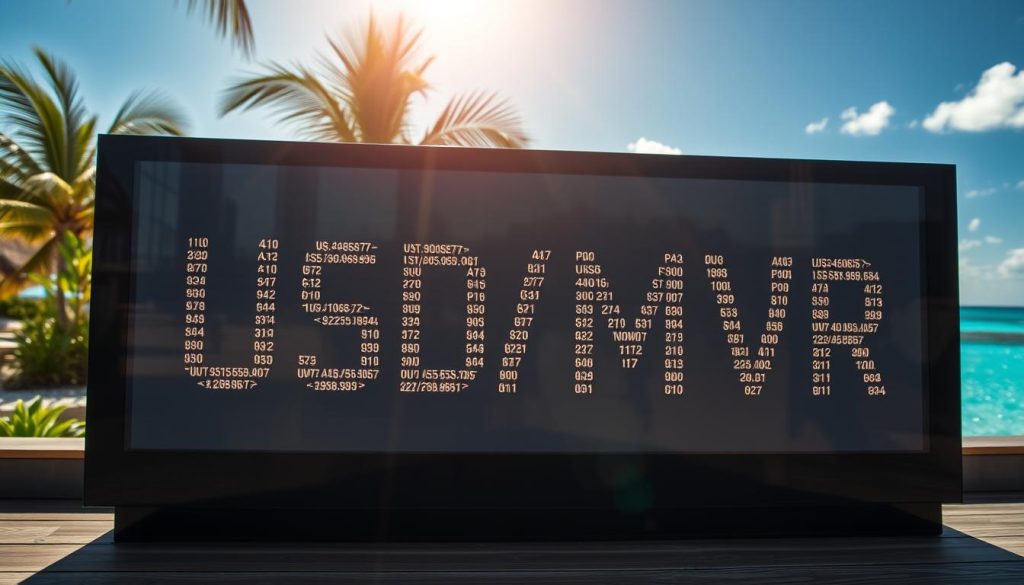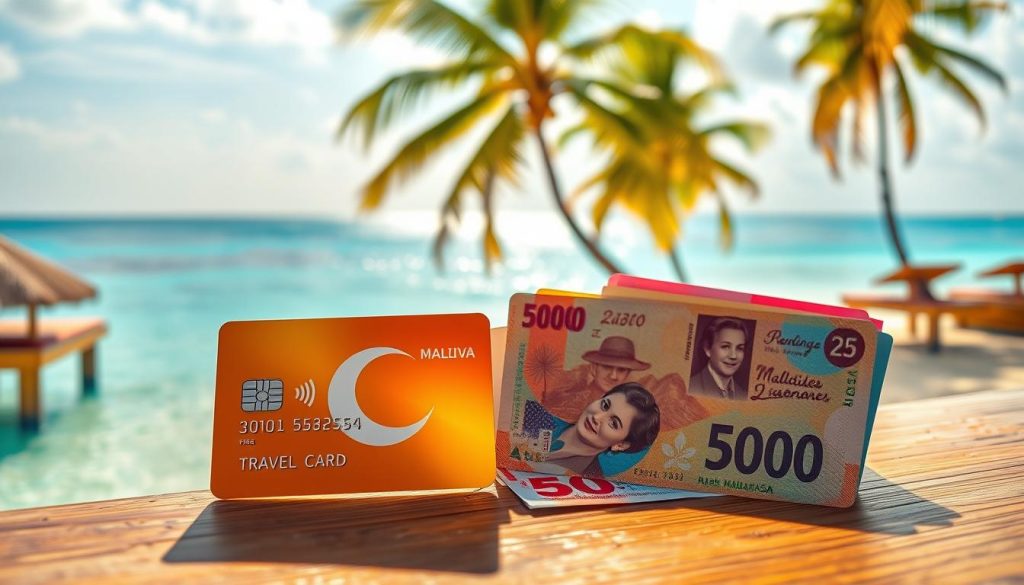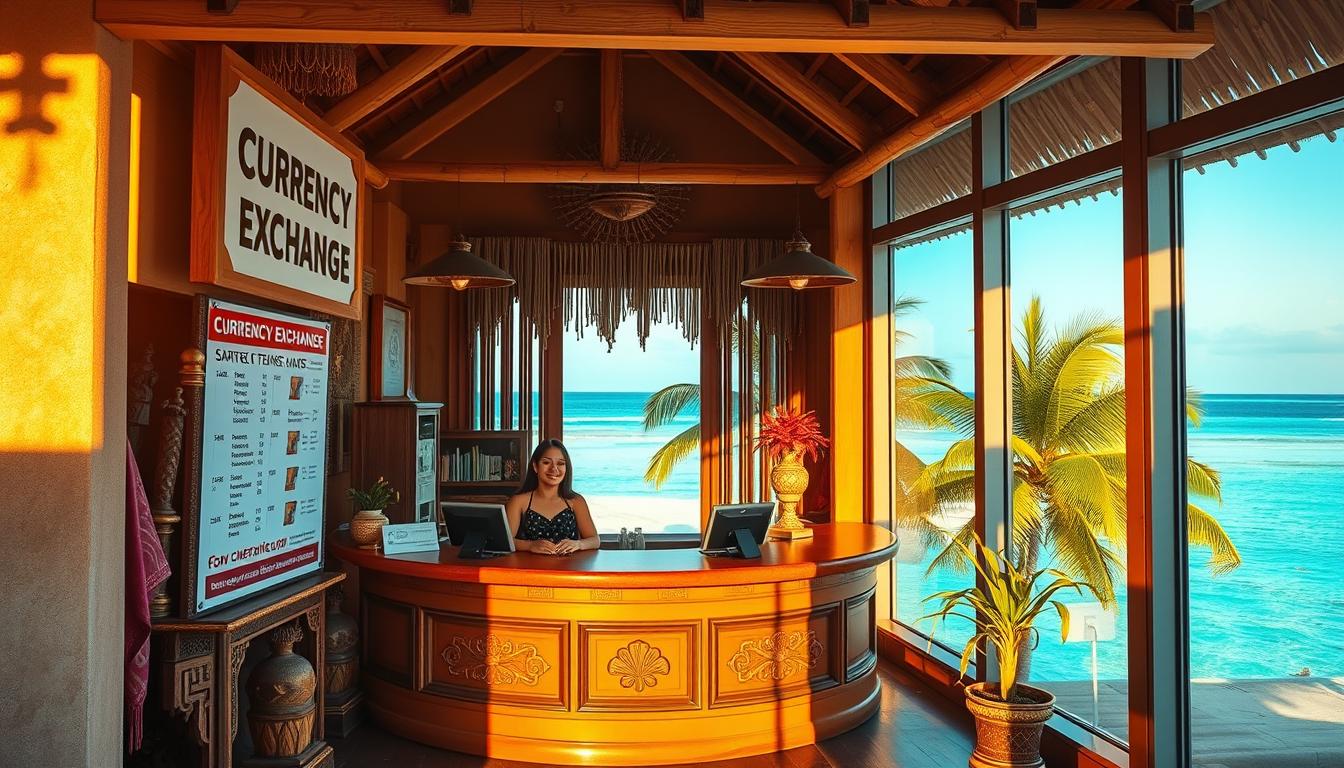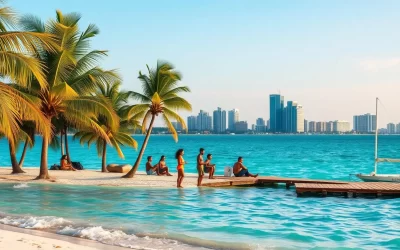Did you know that currency exchange fees at airports can add up to 10% or more to your travel budget? Understanding how to manage your money wisely is crucial for a stress-free trip. This guide will help you navigate the ins and outs of payments and currencies in this stunning destination.
From exchange rates to the best ways to pay, we’ve got you covered. You’ll learn how to avoid hidden fees, use cards effectively, and even save money on your stay. Whether you’re planning a budget-friendly trip or a luxury getaway, knowing the local currency and payment options is key.
We’ll also dive into the benefits of using travel cards like Wise and other providers. Plus, you’ll discover how to get the best rates and avoid common pitfalls. Let’s make your journey as smooth as possible—starting with your money!
Currency Basics in Maldives
Navigating the local currency can make or break your travel experience. The official currency is the Maldivian Rufiyaa (MVR), which is divided into 100 laari. Banknotes come in denominations like Rf 5000, Rf 1000, and Rf 10, while coins include Rf 2, Rf 1, and smaller laari values.
Understanding the Maldivian Rufiyaa (MVR)
The MVR is the backbone of local transactions. While US dollars are sometimes accepted, especially in resorts, the Rufiyaa is the preferred currency for everyday use. Knowing the basics, like the exchange rate (1 USD ≈ 15.4 MVR), helps you plan your budget effectively.
Currency Acceptance and Local Usage
Cash is king in many local areas, especially for small purchases or tipping. While credit cards are widely accepted in resorts, they may not be as useful on smaller islands. Always carry some MVR for convenience, as change is typically given in the local currency.
Using US dollars can sometimes lead to higher costs or issues with change. For example, bills must be in pristine condition, and smaller denominations are recommended for tips. Understanding these nuances ensures you get the best deal and avoid unnecessary fees.
Understanding the Live USD/MVR Exchange Rate
The live USD/MVR exchange rate plays a key role in your travel budget. It determines how much you’ll spend on meals, hotels, and activities. Staying informed about this rate helps you plan better and avoid overspending.

Mid-Market Rate versus Markup Rates
The mid-market rate is the real-time exchange rate used in global currency markets. It’s the benchmark for fair conversions. However, most providers add a markup, increasing the cost of exchanging your money.
For example, if the mid-market rate is 15.4 MVR per USD, a provider might offer 15.2 MVR. This small difference can add up, especially for larger transactions. Always check the mid-market rate before exchanging your currency to ensure you’re getting a fair deal.
Markups are common at airports, hotels, and local exchange counters. While convenient, these options often come with higher fees. Using online tools or apps like Wise can help you compare rates and save money.
Monitoring live rates also helps you time your exchanges better. Rates fluctuate daily, so exchanging when the rate is favorable can lower your overall cost. This is especially useful for budgeting meals, tips, and other expenses during your trip.
Should You Exchange USD to MVR Before Your Trip?
Exchanging your money before you travel can make your journey smoother and more cost-effective. It’s a smart way to avoid last-minute stress and ensure you’re ready for any situation. Let’s explore the benefits and risks of pre-travel currency exchange.
Benefits of Pre-Travel Currency Exchange
Exchanging your USD to MVR before your trip has several advantages. First, you’ll likely get better rates compared to airport or last-minute exchanges. Providers often add markups at these locations, increasing your cost.
Second, having local cash on hand saves time upon arrival. You won’t need to search for an exchange counter or ATM, especially if you’re heading to a remote area. This is particularly useful for tipping or small purchases.
Lastly, pre-planning your money helps you stick to your budget. You’ll know exactly how much you’ve spent on currency exchange, avoiding surprises during your trip.
Risks of Airport and Last-Minute Exchange
Exchanging money at the airport or upon arrival can be risky. Rates are often less favorable, with fees ranging from 5% to 15%. This can significantly increase your cost, especially for larger amounts.
Another issue is convenience. Airport exchange counters may have long lines, wasting valuable time. Plus, some providers only accept pristine bills, which can be a hassle if your cash isn’t in perfect condition.
To avoid these pitfalls, research exchange options in advance. Look for reputable providers with competitive rates. Online tools like Wise can help you compare rates and find the best deal.
By planning ahead, you’ll save money, time, and stress—making your trip more enjoyable from the start.
Tips and Tricks for Exchanging Money in the Maldives
Managing your money wisely during your trip can save you time and stress. Whether you’re withdrawing cash or paying at local merchants, a few smart strategies can help you avoid unnecessary fees and get the best rates.
Best Practices at Merchants and ATMs
When paying at merchants, always choose to be charged in the local currency. This avoids dynamic currency conversion, which often comes with poor exchange rates and hidden fees. Always double-check your receipt to ensure you’re billed in MVR.
For ATMs, look for ones that offer competitive conversion rates and low fees. Using local ATMs is often the best way to get cash without overpaying. Make fewer, larger withdrawals to reduce transaction costs.
Avoiding Dynamic Currency Conversion
Dynamic currency conversion (DCC) is when a merchant or ATM offers to charge you in your home currency instead of the local one. While it might seem convenient, the exchange rates are usually unfavorable. Always opt for MVR to save on cost.
To spot DCC, watch for prompts on card machines or receipts. If you’re unsure, ask the merchant to charge you in the local currency. This simple step can save you money on every transaction.
Using a travel card like the Wise Multi-Currency Card is another practical solution. It offers competitive rates and low fees, making it a great option for managing your budget. Plus, you can load multiple currencies in advance, giving you flexibility during your trip.
By following these tips, you’ll keep your travel expenses in check and enjoy a stress-free experience. Planning ahead and staying informed are the keys to getting the best deal on your money.
Payment Options in Maldives: Cards, Cash, and More
Understanding your payment options can make your trip smoother and more enjoyable. Whether you’re staying at a luxury resort or exploring local islands, knowing how to pay ensures you stay within your budget and avoid unnecessary fees.
Using Debit and Credit Cards Effectively
Debit and credit cards are widely accepted in resorts and larger establishments. They’re convenient for larger purchases like hotel stays or excursions. However, be aware of foreign transaction fees, which can add up to 3% or more to your cost.
Popular travel cards like Wise and 28 Degrees Platinum offer competitive exchange rates and low fees. These cards are ideal for managing your money while abroad. Always notify your bank before your trip to avoid blocked transactions.
Cash Transactions and Their Role
Cash is essential for smaller vendors, local markets, and tipping. While cards are convenient, many smaller businesses only accept cash. Carrying some local currency ensures you’re prepared for any situation.
ATMs are available in Malé City and larger islands, but they can be scarce in remote areas. Withdraw larger amounts to minimize transaction fees. For tips, keep small denominations of cash on hand.
| Payment Method | Pros | Cons |
|---|---|---|
| Debit/Credit Cards | Widely accepted in resorts, convenient for large purchases | Foreign transaction fees, limited use in local areas |
| Cash | Essential for small vendors and tipping, no fees | Risk of loss, limited ATM availability in remote areas |
| Travel Cards | Low fees, competitive exchange rates, multi-currency support | Requires advance planning, limited use in cash-only areas |
Having multiple payment options ensures you’re covered in case one method fails. A mix of cards, cash, and a travel card is the best way to handle your expenses. Plan ahead to make your trip stress-free and enjoyable.
Maldives: Ultimate Travelers Guide to Currencies & Payments
When it comes to managing your funds, you have two main options: local exchange or travel cards. Each has its own benefits, and choosing the right one can save you both time and money. Let’s break down the pros and cons to help you decide.

Reliability of Local Exchange Services
Local exchange services are widely available, especially in city centers and airports. They’re convenient if you need cash quickly. However, these services often come with higher fees and less favorable rates. For example, airport exchange counters may charge up to 15% in markups.
Another downside is the lack of consistency. Rates can vary significantly between providers, and some may not accept worn or damaged bills. This can add unnecessary stress to your trip.
Benefits of Travel Cards
Travel cards, like those offered by Wise, are a modern and efficient way to manage your currency. They provide competitive exchange rates and lower fees compared to traditional exchange services. With a travel card, you can lock in rates in advance, avoiding surprises during your travel.
These cards are also highly convenient. You can load multiple currencies, making it easy to switch between them as needed. Plus, they’re widely accepted, so you won’t have to worry about carrying large amounts of cash.
Convenience on the Go
Travel cards shine when it comes to convenience. Whether you’re exploring remote islands or dining at a local restaurant, having a card means you’re always prepared. You can also track your spending in real-time, helping you stick to your budget.
On the other hand, local exchange services require you to plan ahead. You’ll need to find a reliable provider and ensure you have enough cash for your needs. This can be time-consuming, especially in less touristy areas.
Ultimately, the best option depends on your travel style. If you prefer simplicity and better rates, a travel card is the way to go. For those who need cash quickly, local exchange services can be a viable alternative. Researching both options ahead of your trip ensures you make the right choice.
Best Places to Get Currency Exchange in Maldives
Finding the right place to exchange your money can make a big difference in your travel expenses. Whether you’re in a bustling city center or arriving at the airport, knowing where to go ensures you get the best rate and avoid unnecessary fees.
City Centers vs. Airport Providers
Airport exchange counters are convenient, especially right after your arrival. However, they often charge higher fees and offer less favorable rates. For example, markups can range from 5% to 15%, significantly increasing your cost.
In contrast, city centers like Malé have more competitive options. Local banks and money changers typically offer better rates and lower fees. Popular providers like “Currency Exchange” on Chaandhanee Magu are highly rated for their fair deals and excellent service.
Local Money Changers and Banks
Local money changers are a great option for getting cash quickly. They often operate longer hours, with some staying open until 11:00 PM. These providers are ideal for smaller transactions and offer competitive rates compared to airports.
Banks, on the other hand, are reliable and secure. They charge commissions ranging from 0.5% to 2% per transaction. Major banks like the Bank of Maldives and Commercial Bank of Maldives are trusted by both locals and tourists.
| Location | Pros | Cons |
|---|---|---|
| Airport | Convenient, available upon arrival | Higher fees, less favorable rates |
| City Centers | Better rates, lower fees, more options | May require travel from airport |
| Local Money Changers | Competitive rates, longer hours | May not be as secure as banks |
| Banks | Secure, reliable, lower commissions | Limited hours, may require ID |
Before exchanging your money, compare several providers to find the best deal. Look for transparency in rates and fees, and always ask about additional charges. This simple step can save you both time and money during your trip.
How to Avoid High Fees and Poor Exchange Rates
Hidden fees can sneak up on you, especially when exchanging money during your travels. Knowing how to spot and avoid these costs can save you a significant amount of money. Let’s explore practical strategies to ensure you get the best deal.

Spotting Hidden Surcharges and Markups
Hidden surcharges often appear as small percentages added to the exchange rate. For example, a provider might offer a rate slightly lower than the mid-market rate, adding a markup of 2-5%. Always compare the published rate with the live mid-market rate to ensure fairness.
Dynamic currency conversion (DCC) is another common fee. This occurs when a merchant or ATM offers to charge you in your home currency instead of the local one. While convenient, the exchange rates are usually unfavorable. Always opt for the local currency to save on cost.
- Check the mid-market rate: Use online tools or apps to compare rates before exchanging your money.
- Avoid DCC: Always choose to be charged in the local currency to avoid hidden fees.
- Ask about fees: Inquire about additional charges before committing to an exchange.
Travel experts recommend using travel cards like Wise for competitive rates and low fees. These cards allow you to lock in rates in advance, avoiding surprises during your travel.
By staying vigilant and informed, you can avoid unnecessary costs and make the most of your money. A little research goes a long way in ensuring a smooth and budget-friendly trip.
Comparing Travel Money Options: Debit, Prepaid, and Credit Cards
Choosing the right travel money option can save you both time and money during your trip. With so many choices available, it’s important to understand the pros and cons of each. Let’s explore the most popular options: debit, prepaid, and credit cards.
Advantages of Using a Wise Travel Card
The Wise travel card is a standout option for international travelers. It offers low fees and uses the mid-market exchange rate, ensuring you get the best rate for your money. You can hold and convert multiple currencies in one account, making it ideal for trips to multiple destinations.
Another benefit is its flexibility. You can reload your card anytime, anywhere, and use it for both purchases and ATM withdrawals. With competitive fees and real-time currency conversions, the Wise card is a practical choice for savvy travelers.
Insights on 28 Degrees Platinum and Other Providers
If you prefer a credit card, the 28 Degrees Platinum is a great option. It has no international transaction fees, making it cost-effective for overseas spending. Plus, it offers rewards and travel perks, such as travel insurance and purchase protection.
Other providers like Revolut also offer multi-currency cards with low costs and advanced features. These cards are perfect for travelers who want to manage their money efficiently while avoiding hidden fees.
- Debit Cards: Convenient but may have high foreign transaction fees.
- Prepaid Cards: Allow you to lock in exchange rates and avoid overspending.
- Credit Cards: Offer rewards but may come with annual fees.
When selecting a card, consider your spending habits and travel style. For example, if you prefer cashless transactions, a travel card like Wise is the best way to go. If you value rewards, a credit card like 28 Degrees Platinum might be more suitable.
By comparing these options, you can find the perfect solution for your needs. Whether you prioritize low fees, flexibility, or rewards, there’s a card that fits your travel plans.
Money-Saving Tips for Managing Your Travel Budget in Maldives
Smart budgeting can transform your travel experience without breaking the bank. With a little planning, you can enjoy every moment of your trip while keeping your costs under control. Here are some practical strategies to help you save money and make the most of your travel.

Plan Ahead for Accommodation and Meals
Booking your stay in advance can save you a significant amount of money. Resorts and hotels often offer discounts for early reservations. For example, booking six months ahead can reduce your price by up to 20% compared to last-minute bookings.
When it comes to meals, consider staying at guesthouses or local cafes. A meal at a local café can cost as little as $5, while resort restaurants may charge $20 or more. Planning your meals ahead of time helps you stick to your budget without sacrificing quality.
Split Expenses and Book Packages
Traveling with a group? Splitting costs for accommodations and transportation can significantly reduce your expenses. For instance, sharing a speedboat ride can cut your cost by half compared to traveling alone.
Booking packages for excursions or activities is another great way to save. Many providers offer bundled deals for snorkeling, diving, or island tours. These packages often come at a lower rate than booking activities separately.
Track Spending and Adjust as Needed
Keeping track of your spending during your trip helps you stay within your budget. Use apps or a simple notebook to log every expense. This allows you to identify areas where you can cut back and make adjustments in real-time.
For example, if you notice you’re spending too much on dining out, consider buying groceries from local markets. This simple switch can save you money while still allowing you to enjoy fresh, local ingredients.
By following these tips, you can enjoy a fulfilling travel experience without overspending. Planning ahead, splitting costs, and tracking your budget are the best way to make the most of your trip. Happy travels!
Conclusion
Planning your travel finances ahead of time ensures a stress-free and enjoyable experience. By understanding the local currency and monitoring exchange rates, you can avoid unnecessary costs and make the most of your money.
Using a card like Wise or carrying some local cash are practical ways to handle payments. These options help you stay flexible and prepared for any situation. Always check for hidden fees and opt for the mid-market rate to get the best deal.
Taking these steps not only saves you money but also makes your trip smoother. Whether you’re exploring local markets or dining at resorts, a well-thought-out plan ensures you’re always ready.
For more detailed tips, feel free to revisit this guide. Wishing you a fantastic journey filled with unforgettable experiences!
The above is subject to change.
Check back often to TRAVEL.COM for the latest travel tips and deals.
Here are some Tours & Sightseeing suggestions that might pique your interests!




